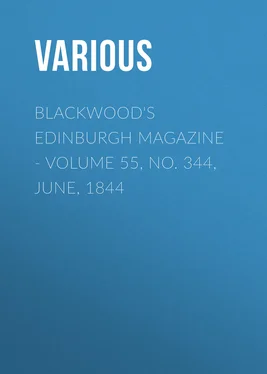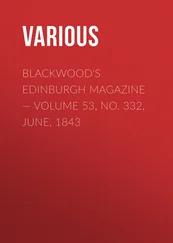Various - Blackwood's Edinburgh Magazine. Volume 55, No. 344, June, 1844
Здесь есть возможность читать онлайн «Various - Blackwood's Edinburgh Magazine. Volume 55, No. 344, June, 1844» — ознакомительный отрывок электронной книги совершенно бесплатно, а после прочтения отрывка купить полную версию. В некоторых случаях можно слушать аудио, скачать через торрент в формате fb2 и присутствует краткое содержание. Издательство: Иностранный паблик, Жанр: foreign_antique, periodic, foreign_edu, на английском языке. Описание произведения, (предисловие) а так же отзывы посетителей доступны на портале библиотеки ЛибКат.
- Название:Blackwood's Edinburgh Magazine. Volume 55, No. 344, June, 1844
- Автор:
- Издательство:Иностранный паблик
- Жанр:
- Год:неизвестен
- ISBN:нет данных
- Рейтинг книги:4 / 5. Голосов: 1
-
Избранное:Добавить в избранное
- Отзывы:
-
Ваша оценка:
- 80
- 1
- 2
- 3
- 4
- 5
Blackwood's Edinburgh Magazine. Volume 55, No. 344, June, 1844: краткое содержание, описание и аннотация
Предлагаем к чтению аннотацию, описание, краткое содержание или предисловие (зависит от того, что написал сам автор книги «Blackwood's Edinburgh Magazine. Volume 55, No. 344, June, 1844»). Если вы не нашли необходимую информацию о книге — напишите в комментариях, мы постараемся отыскать её.
Blackwood's Edinburgh Magazine. Volume 55, No. 344, June, 1844 — читать онлайн ознакомительный отрывок
Ниже представлен текст книги, разбитый по страницам. Система сохранения места последней прочитанной страницы, позволяет с удобством читать онлайн бесплатно книгу «Blackwood's Edinburgh Magazine. Volume 55, No. 344, June, 1844», без необходимости каждый раз заново искать на чём Вы остановились. Поставьте закладку, и сможете в любой момент перейти на страницу, на которой закончили чтение.
Интервал:
Закладка:
“The tract of country,” says Willkomm in his Preface, “the true Highlands of Upper Lusatia, called by the inhabitants themselves the Upper Country, to which the tales are native, is one very narrowly circumscribed. It amounts to scarcely ten square (German) miles. I have, however, selected it for my undertaking,” he continues, “because it is intimately familiar to me; because the innermost character of the small population who inhabit it is confidentially known to me; because there is hardly a road or a path in the country which, on the darkest night, I could not find. Interesting, romantic, magnificent is the piece of earth which, at the confines of Bohemia, runs over hilly heights and lofty hill, tops on to the high mountain-chain. But still more interesting, I maintain with confidence, is the race of people.”
It may seem strange at first, that the wise and profound explorers whom we have so often had occasion to cite, the brothers Grimm, should have failed to present us with any traditions from a corner of ground around which they have so successfully laboured. We have hinted already at the sufficient reason of the blank. Willkomm tells us, that the rest of the world, which “the cabin’d cribb’d” Lusatian has himself learned to call “ o’ th’ outside ,” has taken no cognisance of his beautiful hill country. Lusatia has a literature of her own, and no one is acquainted with it. “She had, and partly still has, her own, similar to the Imperial cities, exceeding free and energetic municipal constitution.” But no one cares about it. Celebrated and learned historians, questioned by Willkomm on the subject, have acknowledged their ignorance in regard to the character and laws of its small people. A more cogent reason, however, lies nearer home, in the impenetrable reserve and self-insulation of the mountaineers themselves. Willkomm confesses that their coldness towards strangers is unparalleled; they have no confidence whatever in foreigners; “and let a Lusatian but suspect,” he says, “that you come a-fishing to him, and to listen out his privacies; then may you,” as we may render the Lusatian proverb, “‘Lose yourself before you find his mushroom.’” He will communicate to strangers little of his manners and customs; of his superstitious practices, his sacredly guarded traditions, absolutely nothing. “He is unpliant, self-sequestered, coarse-grained; beyond all conception easy and phlegmatic.”
Every genuine people, however, is rough-handed; and Willkomm proceeds, after an ingenuous description of their defects, to vindicate the natural heart of his brother highlanders. “Let him amongst the gentle,” he proudly exclaims, “who desire to hear for once something novel, something right vigorous, sit down beside me. He need not fear that morals and decency will be cast out of doors. No, no! The people are thoroughly moral and chaste at heart, if they are somewhat coarse in expression;—ay, and tender withal. Their imagination glides as delighted along fragrant threads of gold, as it eagerly descends amongst the powers of darkness, amidst the dance of will-o’-the-wisps and horrible ghost-reels. They are, at once, a blunt, good-hearted, aboriginal stamp of men, with all the advantages and deficiencies appurtenant.”
The Lusatian traditions, brought to light in Germany by Ernst Willkomm, and now first made known to Englishmen in these pages, were collected by our author, as we have already observed, with difficulty and labour. A native only of the mountain district could obtain from the lips of the people their sacred and well-preserved lore, and even he not easily. The tales were narrated from time to time in the spinning-room, or in the so-called “ Hell ” of the boor or weaver, without any determinate connexion. The listener gathered mere fragments, and these not fully, when, thrown off his guard, he ventured to interrupt the speaker. Each narrator conceives his tale differently, and one individual is apt to garnish the experience of many, or what he has heard from others, with a little spice of his own invention. Further, the details of ten or twelve occurrences are associated with one single spot; all of which appear externally different, and yet internally are connected closely, “so that when comprehended in one whole picture, and not till then, they form what, in a strict and literary sense, we are accustomed to call a Tradition or Tale. I, at least,” adds Ernst Willkomm, “in such an upgathering of these disjointed tones of tradition, could only accomplish something that satisfied me by searching out the profound hidden meaning of the people’s poesy: and I have at last gone no further than attempting to compose these detached fragments of tradition, Lusatianwise and popularwise, from the people’s own telling, into a whole. Upon this scheme only could alike the poetical worth of the tales, and the portraiture of the race, be rescued and rightly secured.”
That the traditions have been rescued and maintained in their purity and truth; coloured, no doubt, in the telling, and that unavoidably, under the pencil of their educated renderer—we have every reason to believe from internal evidences. Maintaining their own originality, they correspond in the main to the traditions which come to us from almost every known country on the globe, concurring to attest the intimate and necessary relation of the human soul with what would seem to be the remnants of an ancient and universal mythology. They bear upon their front the minute impress of reality, not to be mistaken, and beyond the mere invention of the poet. They are a valuable addition to the common stock. The style of Willkomm is clear, and to the point; almost always, as he says, in characterizing the speech of his own Upper Lusatians, “hitting the nail upon the head.” It breathes of his own mountain air, and possesses a charm, a vigour, and freshness, which we fear that we shall endeavour in vain to transfer to the following version:—
“Children born of a Sunday, and bastards, inherit the gift, denied to other human beings, of beholding spirits, of talking with them, and, if opportunity befriend, of right intimately communing with them. This was a truth experienced by pretty Maud, the stone-mason’s only daughter, who, a hundred years ago or so, led, at the foot of the mountain-ridge yonder, a quiet home-loving life. Maud was born, of all days in the year, upon Easter Sunday, which is said to be a truly lucky day for a mortal not otherwise heavily burdened with earthly blessings. In this last respect, Maud had no reasonable cause of complaint; for her father, by the labour of his hands, painfully earned just as much as went to a frugal housekeeping, and the mother kept the little family in order; so that things looked always neat and clean enough in the abode of the stone-mason.
“All Sunday’s children are very wise, and, if they are maidens, always uncommonly beautiful. Maud was, as a child, admired by every body; nay, it once went so far, as that a rich and beautiful, but very sickly-looking, lady of quality, who was travelling over the mountain in a fine carriage, tried hard to coax the poor mother out of her pretty Maud with a large sum of gold. When the maiden had fairly stepped out of child’s shoes, and was obliged to seek employment away from home, there was a mighty ado. It was for all the world as if a fairy was going through the place, when Maud, early in the morning, strolled along the banks of the murmuring stream on her road to a wealthy weaver’s. The young fellows saluted the fair one as they greeted no other. No one ventured, however, to accost her with unseemly speeches—a kind of thing, by the way, that young men at all times are very prone to. Maud was treated by every one like a saint. Maidens even, her equals in years, prized her highly; and in no way envied her the general admiration. This might be founded in the behaviour itself of Maud. More forward to oblige, to do good offices, more sweetly behaved, was no one. And then she had such a grace with it all, so innocent an eye, that when you looked into it, heaven itself seemed to shine out upon you. In short, whoever spoke with Maud, or might walk a few steps with her, that man was for the whole day another and a happier creature, and whatever he undertook prospered with him.
Читать дальшеИнтервал:
Закладка:
Похожие книги на «Blackwood's Edinburgh Magazine. Volume 55, No. 344, June, 1844»
Представляем Вашему вниманию похожие книги на «Blackwood's Edinburgh Magazine. Volume 55, No. 344, June, 1844» списком для выбора. Мы отобрали схожую по названию и смыслу литературу в надежде предоставить читателям больше вариантов отыскать новые, интересные, ещё непрочитанные произведения.
Обсуждение, отзывы о книге «Blackwood's Edinburgh Magazine. Volume 55, No. 344, June, 1844» и просто собственные мнения читателей. Оставьте ваши комментарии, напишите, что Вы думаете о произведении, его смысле или главных героях. Укажите что конкретно понравилось, а что нет, и почему Вы так считаете.












